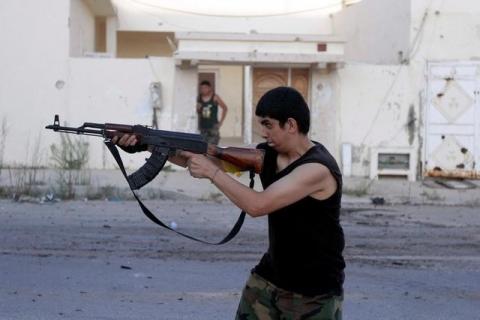Advertisement
Libya's eastern parliament votes against UN-backed government in Tripoli
BENGHAZI, Libya (Reuters) - Opponents of Libya's U.N.-backed unity government dealt the beleaguered body a blow on Monday by voting to reject it in a rare session of the eastern-based parliament, though the government's supporters dismissed the move as unconstitutional.
The Government of National Accord (GNA), the product of a U.N.-backed deal signed in December, has been seeking endorsement for months as it tries to extend its influence and authority beyond its base in Tripoli, in western Libya.
Western powers have been counting on the GNA to tackle Libya's security vacuum - including the presence of Islamic State - revive oil production, and stem the flow of migrants crossing the Mediterranean to Europe. But power-brokers in the east say it is trying to undermine the military.
The vote was the first since January, when the parliament rejected an initial list of ministers put forward by the GNA's leadership, or Presidential Council, which is meant to represent all sides of Libya's fractured politics.
The Council arrived in the capital in March seeking to overcome divisions that have surfaced since the overthrow and killing of veteran ruler Muammar Gaddafi in 2011.
In 2014, an armed alliance took control of institutions in Tripoli and the then newly elected, internationally recognised parliament relocated to the east.
The GNA, the United Nations, and Western states have lobbied hard for a vote to be held, expressing frustration when parliamentary sessions in Tobruk were repeatedly delayed or blocked as opposition to the GNA in eastern Libya hardened.
It was unclear whether following the vote, the GNA in its present form would continue to seek endorsement from the parliament.
Spokesman Abdallah Bilhaq said 101 deputies had attended Monday's session, with 61 voting against the GNA, 39 abstaining, and just one voting in favour. The number of attendees was a little over half the chamber, but even the figure needed for a valid vote is the subject of dispute.
A bloc of pro-GNA lawmakers that says it represents about 100 deputies accused the government's opponents of hijacking the parliamentary process.
THREATS
"We stress that parliament's decision has to be taken by the whole parliament in a legal session in the presence of all members," a statement from the bloc said. "We will continue working for the unity of the Libyan territory to find a way out of this crisis through a government of consensus that is free from regional, tribal and personal conflicts."
One deputy, Jalal al-Shwaihdi, said GNA supporters had been taken by surprise. "We sent a delegation of supporters of the government to Tobruk to consult on the work schedule but the parliament's president took advantage of the situation to hold a vote," he said.
Pro-GNA lawmakers have previously complained that opponents used force and threats to prevent votes from taking place.
The technical reasons given for the rejection of the GNA on Monday were that lawmakers wanted a shorter list of ministers, and demanded that Ali Gatrani, an eastern Presidential Council member who has suspended his participation, should rejoin the body.
Parliamentary spokesman Bilhaq said some lawmakers had opposed the GNA "from the start because of the lack of credentials and qualifications of the ministers and because the government had not achieved any of the things expected of it".
While forces aligned with the GNA have largely recaptured the coastal city of Sirte from Islamic State militants, the government has struggled to make an impact in other areas, losing support because of its inability to resolve a liquidity crisis, power cuts and other problems.
One reason for opposition to the GNA in the east is the reluctance of power holders there to grant the Tripoli government authority over military appointments.
Dominant eastern factions support forces led by General Khalifa Haftar, who has been waging a military campaign against Islamists and other opponents in Benghazi and parts of the east. They say the GNA is dependent on Islamist-leaning armed groups.
"We reject this government because it is waging a war against the institution of the military, and it wants to support the role of militias on the Libyan stage," said GNA opponent Abubakr al-Ghazali following the vote.
GNA lawmakers would now "look to form a smaller government of national accord compatible with the leadership needs at this stage", he said.
(Writing by Aidan Lewis; Editing by Andrew Roche and Alison Williams)



















Add new comment